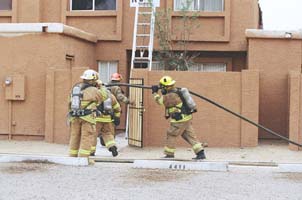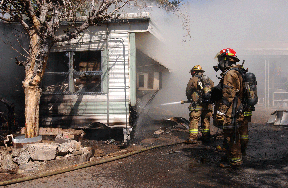Living Safely in Your Apartment or Mobile Home
 Printable Apartment Safety Flyer (English)
Printable Apartment Safety Flyer (English)
 Printable Apartment Safety Flyer (en espanol)
Printable Apartment Safety Flyer (en espanol)
 Printable Mobile Home Safety Flyer (English)
Printable Mobile Home Safety Flyer (English)
 Printable Mobile Home Safety Flyer (en espanol)
Printable Mobile Home Safety Flyer (en espanol)


Unique hazards increase danger for people who live in apartments or mobile homes:
Often, there is only one way in or out---no back door.
Stairways are often built entirely of wood. If the stairwell or walkway is on fire, you may not be able to exit through the front door.
Congested parking can mean blocked fire hydrants and/or blocked fire lanes. (A ladder truck can be 8 to 9-feet wide and 50-feet long. A blocked fire lane can slow down response time.)
An apartment building is, in effect, a very densely populated neighborhood. (If the downstairs or next-door apartment is on fire, it can spread quickly to adjoining apartments in a matter of minutes.)
Without properly working smoke alarms, it may take a long time before you find out that another part of the apartment building is on fire. Consequently, this could cut your chances of getting out of the building alive.
Tips for living safely in apartment buildings or mobile home communities:
Make sure you have smoke alarms that work.
The Fire Code requires working smoke alarm(s) in every apartment unit/mobile home. Existing apartments/mobile homes require smoke alarms in the hallway outside sleeping areas. Newly constructed apartments/mobile homes now require them IN the sleep room, as well. Remember to check the batteries once a month, and replace the batteries once a year.
The apartment/mobile home complex is required to have a fire extinguisher within 75-feet travel distance.
If extinguishers are not provided outside the apartments/mobile homes, then each apartment/mobile home is required to have one.
The Fire Code states that no person shall use fixed or portable barbecues in or under any attached covered patios, balconies, covered walkways or roof overhangs unless it has a fire sprinkler.
When in use, barbecues should be located on ground level and be a minimum of 10-feet from buildings, structures, covered walkways or roof overhangs.
Don’t park in front of fire hydrants and don’t park in fire lanes.
Respecting the fire restrictions may literally save your life. When friends visit, be sure to remind them to park only in appropriate parking areas.
Never leave smoking materials burning. Never smoke in bed.
Have a fire escape plan. Practice it.
Know at least two ways to get out of your apartment/mobile home. Pick a family meeting place outside the apartment building/mobile home. Don’t use elevators (they may take you right into the fire).
Make sure there’s a number on your apartment/mobile home door.
If there isn’t, contact management, it's required by the Fire Code.
Keep a copy of your apartment/mobile home number and apartment building number, inside your apartment/mobile home, near the phone. The information will then be handy for babysitters, and it will be there if you panic.
Complex owners and managers need to be sure gated driveways are accessible to firefighters.
75-percent of multi-housing complexes and mobile home communities are now gated. Work with the fire department to make sure access and requirements are met.
Don’t run extension cords under carpets or from unit-to-unit.
They can easily overheat. Extension cords are for temporary use only. They are not to be used as a substitute for permanent wiring.
Get acquainted with the elderly folks in your building or community. They may need assistance in an emergency.
They may have extra difficulty getting out. You may be able to help them, or you can direct firefighters to the elderly person’s apartment/mobile home.
Keep the fire lanes open.
If you can’t get out, use a mobile phone to stay in touch with 9-1-1 dispatchers. Shine a flashlight or wave a sheet out the window to alert firefighters that you’re trapped.
Stay calm.
Because families in apartment complexes and mobile home communities live so close together, there are special areas of concern when it comes to fire safety.
Apartment complexes are simply a series of small, connected homes. It’s important to remember that what you do in your apartment or mobile home can affect people living six-doors down, or even in the next building.
Finally, swimming pools pose a separate hazard for people who live in apartment complexes or mobile home communities. Pools must be fenced, and the gates must close and latch on their own. If children use the pool, an adult must always be inside the gate, in the pool area, constantly watching the children.
